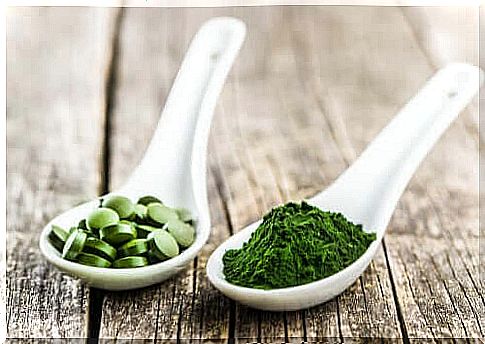Chlorella For Dogs: 3 Important Benefits

Chlorella is a genus of unicellular green algae commonly used as a dietary supplement. It is a microscopic alga with an intense green color determined by its photosynthetic pigments. Chlorella for dogs, as for us and other animals, brings valuable benefits, so it is very useful to include it in the diet.
Chlorella is marketed in capsules as a food supplement. This small single-celled alga contains a high percentage of proteins, essential fatty acids (or EFAs), minerals and vitamins. It is currently considered a super food and its purifying properties are increasingly well known.
Below we will explain what some of the benefits of introducing chlorella into dogs’ diets are and how it can help.
1. Chlorella enhances the immune response
The components of this precious alga strengthen the body’s defenses against pathogens such as viruses, bacteria or fungi. It has also been shown to be effective in assimilating nutrients and improving gastrointestinal health. Furthermore , its high content of natural antioxidants delays cellular aging.

2. Healthier, brighter skin and hair
Some vitamins are needed to keep the skin and coat healthy. Chlorella contains a good percentage of Vitamin A, Vitamins C and minerals that help the skin and coat of your dog friends. The Chlorella vulgaris species helps synthesize collagen, which is essential in the production of new regeneration of hair and skin. For these reasons, it is recommended for skin problems such as dermatitis.

3. Purifying effect: an algae that eliminates toxicity from the blood
Its properties include the ability to eliminate toxins from the body, through detoxification of heavy metals such as lead, cadmium and mercury in the liver, kidneys, intestines and blood. Chlorella binds to these metals and is subsequently removed from the body, a process known as metal chelation.
This chelating effect also makes this little alga a valuable aid against infertility, as the toxicity of heavy metals in the diet affects reproduction. For example, it affects the sperm quality of males.

3. What does chlorella for dogs contain?
Chlorella contains essential amino acids, a high percentage and variety of vitamins A, B and C and minerals among which we can highlight iron, phosphorus, magnesium and potassium. It also has a high chloroform content and, in fact, this percentage is higher than many other single-celled algae.
Chlorophyll, in addition to helping to purify the body, acts against halitosis and in fact many toothpastes and dental snacks for dogs have percentages of chlorophyll among the ingredients. We can also find it in fruit and vegetables.
For all these nutrients it is a rich source of proteins, vitamins and minerals, ideal for supplementing the dog’s diet. Many food snacks already have algae in their composition.
If we study the composition of the food we offer to our dog, we can know if it is a food of sufficient quality to keep our friend healthy and strong at all stages of his life or if he needs some kind of supplementation.
How can we find chlorella for dogs?
Chlorella and other algae are sold in tablet or powder form. The dose to be taken is indicated based on the concentration and weight of the dog. As for other food supplements, we should consult with the veterinarian before including them in the diet. Toxicity from excess algae in the diet is very rare, but it is still advisable to be careful and cautious.
Algae are widely used in feed. Chlorella, Spirulina and Dunaliella are marketed as food supplements for cats, dogs, aquarium fish, ornamental birds, horses, cows and breeding bulls. Many times we find food supplements that combine these species of algae in the same product.
For humans, these algae have the same benefits and are consumed by vegans and vegetarians as a source of protein and vitamin B12.









